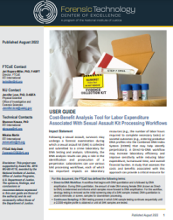DNA Backlog Reduction
Cost-Benefit Analysis Tool for Labor Expenditure Associated With Sexual Assault Kit Processing Workflows
A Guidance Document on the Forensic Application of Massively Parallel Sequencing
Success Story: Bringing Short Tandem Repeat DNA Identification to Law Enforcement
Supporting States to Test Sexual Assault Evidence
Crime laboratory and law enforcement personnel from three states discuss the value the NIJ-FBI Sexual Assault Kit Partnership to test sexual assault evidence and obtain investigatory leads.
During this partnership, NIJ is working with the FBI Laboratory in Quantico, Virginia, to test eligible kits from law enforcement agencies and laboratories across the country and develop best practices that can improve the quality and speed of sexual assault kit processing.
See the YouTube Terms of Service and Google Privacy Policy
Strengthening Our Nation's Crime Laboratories
As technology improves, demand for analysis of DNA and other forensic evidence to help solve crimes grows. This video describes some of the challenges crime laboratories face in meeting this demand and how National Institute of Justice (NIJ) funding has strengthened crime labs and encouraged innovation in forensic techniques.
See the YouTube Terms of Service and Google Privacy Policy
Development of a Probe Capture Next-Generation Sequencing Assay for Analysis of the Mitochondrial Genome and Nuclear STR and SNP Markers
FY 2016 DNA Capacity Enhancement and Backlog Reduction Program - 2016-DN-BX-0125
FY 2015 DNA Capacity Enhancement and Backlog Reduction Program, 2015-DN-BX-0065
Strengthening Our Nation's Crime Laboratories
Why Is There an Evidence Backlog?
See the YouTube Terms of Service and Google Privacy Policy
The National Sexual Assault Policy Symposium
Learn about the NIJ National Sexual Assault Policy Symposium held in September 2016 from its audience members and organizers. The Symposium focused on how the nation is moving forward and finding solutions to the complex issues that arise in sexual assault cases and in testing sexual assault evidence.
See the YouTube Terms of Service and Google Privacy Policy
Progress on Testing Sexual Assault Kits
See the YouTube Terms of Service and Google Privacy Policy
A Conversation With Natasha Alexenko, Founder of Natasha's Justice Project
See the YouTube Terms of Service and Google Privacy Policy



